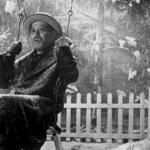Review of Hitchcock, Directed by Sacha Gervasi
By KENDRICK KUO
The opening scene of Hitchcock met with erupting laughter from the theater audience. Ed Gein—the inspiration for the novel Psycho—killed his brother with a shovel to the head in a most comedic way; after which the camera panned to Alfred Hitchcock (Anthony Hopkins) who speaks directly to the audience and prepares them to go behind the scenes of the making of the Psycho movie. The film captures a slice of Hitch’s (a nickname) life, limiting itself to his efforts to bring Psycho to the big screen—from casting and screenplay-drafting to its debut.
Hitch’s strained relationship with his wife Alma Reville (Helen Mirren), also an accomplished director, takes central stage, relegating the actual filming of Psycho to a supporting role.
At first, we do not realize there is any problem between Hitch and Alma, other than the fact that they sleep in separate beds yet in the same room. (I’m not sure whether this is a nod to historical idiosyncrasy or a throwback to the I Love Lucy days of censorship where even insinuations of the marriage bed was forbidden.) But Alma decides to help a man named Whit Cook with his screenplay and is increasingly enthralled by him, driven away by Hitch’s obsession with finding the perfect blond to fantasize over. Alma and Hitch eventually discover that their fantasies are illusions and Alma invests all of herself back into the Psycho production.
Alma had a fantasy of romance that involved the a melding of two creative minds as they typed away on the back porch of an idyllic beach house while sipping wine. This fantasy is crushed when she finds him with a young woman in their hideaway. Hitch’s fantasy fails when he can’t catch the perfect blond who has beauty and mystery that can last indefinitely. Janet Leigh (the lead female of Psycho played here by Scarlett Johansson) is a Hitchcock admirer, but keeps her distance and remains professional in their work relationship. We also learn that Vera Miles (another actress in Psycho played by Jessica Biel) was originally a “Hitchcock girl,” but decided to get married and have a child.
In both these cases, Hitchcock as a love story, drama, and romantic comedy offers a stunningly realistic portrayal of love in marriage. Hitch and Alma are old and unattractive, looking for something fresh and novel, but end up discovering that such a wild goose chase results in only the bitter taste of disappointment. This is refreshingly biblical and presents a perspective on romance that runs counter to the common Hollywood line.
***
But Hitchcock goes beyond a mere love story—though it would have been a good enough movie had it stuck to just that. The film is also a study of Hitchcock’s philosophy of film, or at least an inquiry into why thrillers and horror movies have such a wide appeal (the very appeal Hitchcock played on so often in his movies). The answer may lie less in the ability of the filmmaker as it does in our innate human resonance with murder.
In the opening scene described above, Hitch observes that brother has been killing brother since Cain and Abel. This biblical allusion acts as an anchor for the rest of Hitchcock. Hitch describes this human fascination with gruesome death a number of times throughout the film. More chillingly, Ed Gein makes an appearance in the film on several occasions; first as Hitch’s psychiatrist, then offering advice and insights much like an alter ego.
On one hand, this may be a tribute to Hitchcock’s artistry of enmeshing himself into the twisted psyche of his characters; yet there is a literal parallel between Hitch and Gein. This reaches a climax in the infamous shower scene of blood-curling-screams-and-flashing-knife fame. Janet Leigh is failing to impress and Hitch decides to take the knife into his own hands, which gets the response from Janet that he desires: terror. As Hitch slashes the air with the knife, a variety of characters take Janet’s place in rapid succession: the Paramount Pictures representative that has been giving him a hard time; Whit Cook, the scoundrel wooing his wife.
Within each of us is the capacity to be an Ed Gein. We are restrained from becoming him by common grace. Again, Hitchcock echoes biblical principles. Inside all of us is a murderer. According to Jesus, all of us are condemned as murderers due to hatred in our hearts (Matthew 5:21-22). The full spectrum of sin is seeded in our hearts.
Hitchcock was refreshing in its originality, depth, appropriate exploration of mature themes, and a surprisingly biblical worldview. I highly recommend it.












